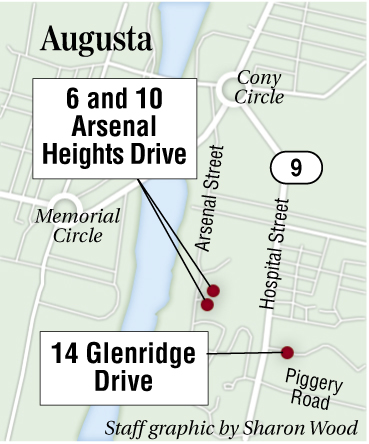AUGUSTA — Mental health patients who have committed violent criminal acts could be moved out of their group home in the Glenridge Drive neighborhood and back onto property next to the Riverview Psychiatric Center.
That would happen under L.D. 340, a bill sponsored by Rep. Corey Wilson, R-Augusta, authorizing the sale of former group homes at 6 and 10 Arsenal Heights Drive on the state’s east side campus and the grounds of the former Augusta Mental Health Institute. The properties would be sold to Motivational Services, a nonprofit mental health care provider that runs the group homes.
Selling the properties would allow Motivational Services to move so-called forensic patients in its care, who moved out of those same group homes on the state campus last year and into homes at 14 Glenridge Drive and 22-24 Green St. The moves prompted some nearby residents to say they were afraid for the safety of their families, and some city officials also raised concerns about potential danger.
Peter DeSchamp, who helped circulate a petition decrying the movement of the forensic patients, all of whom were found not criminally responsible for committing violent crimes, said he thinks Wilson’s bill is a good start.
“I still think the system is broken, but I think this is a good start and has opened many people’s eyes to this issue,” DeSchamp said.
Residents of the Glenridge Drive group home, which is about 500 feet from a nursing home and day care center and near the city’s large Mayfair neighborhood, include Mark A. Bechard, who was committed to a state psychiatric hospital after killing two nuns and severely injuring two others in a Waterville chapel in 1996.
Bechard and the other patients were moved out of the group homes on the state campus in order to preserve the patients’ federal benefits, including Social Security disability. Federal officials warned that the patients no longer would be eligible for such benefits because they considered the state-owned, Motivational Services-run group homes to be a hospital setting.
Wilson said if the group homes are sold to Motivational Services, they no longer will be state property, nor would they be considered part of a state-owned hospital setting, and patients living in them should be eligible for federal benefits.
DeSchamp said he remains concerned about what he sees as a lack of guidelines for group homes and how they should be supervised.
The petition circulated by DeSchamp said the 150 residents who signed it felt the forensic patients moving into the group home would undermine their community’s safety and security.
DeSchamp said Thursday a meeting between Motivational Services officials and the neighborhood alleviated many of the neighbors’ concerns, and he said he thinks the company has done a good job of supervising the patients on Glenridge Drive. He has not heard of any incidents involving the patients and neighbors.
Glenridge Drive is across Hospital Street and just a short distance north of Riverview. The group home on Glenridge is about the same distance from Riverview as the former group homes on the state campus.
Dr. Richard Weiss, executive director of Motivational Services, testified in favor of L.D. 340 before the legislature’s State and Local Government Committee earlier this week.
According to a copy of his prepared testimony, Weiss said Motivational Services wanted to have the two residences available to serve patients whom the court has approved for conditional release from Riverview. The firm owns seven other residential properties.
No one testified in opposition to the bill at the public hearing. Weiss could not be reached for comment Thursday.
However, Wilson said Weiss told him all forensic patients in other Motivational Services group homes, including Glenridge Drive, would be moved back into the group homes on the state campus if the bill and sale of group homes are approved.
“Dr. Weiss gave me his commitment that all forensic patients at other locations would be relocated back to the facility where they were before,” said Wilson, a first-term legislator. “And no new forensic patients would be placed at the group home on Glenridge Drive.”
Wilson said he came up with the possible solution after a community meeting last fall with neighbors and Weiss about the issue. He approached Motivational Services with the idea and found it receptive.
“It sprung into my mind, what if I could get (the patients) located back where they were, allow them to be eligible for their federal benefits, allow the community to be happy and safe?” Wilson said.
Wilson said the state Bureau of General Services had planned to tear down the two former group homes because the state had no use for them and was not aware of anyone interested in buying them.
Wilson said Bureau of General Services officials helped him draft the legislation’s wording.
Normally, surplus state property is put up for public auction. The proposed legislation would allow the state to bypass that process and negotiate directly with Motivational Services.
City Manager William Bridgeo, who testified in favor of the bill, said it might not seem like the best business practice to negotiate only with Motivational Services instead of auctioning off the properties; but he said the properties probably would not have much market value to anybody other than Motivational Services.
“If the state sold them, they would no longer be considered to be part of the AMHI or Riverview campus and could be used to house those patients again,” Bridgeo said. “I think the neighbors (to the Glenridge Drive group home) would welcome that, and the city would welcome that. I think it’s a good idea and a constructive solution to a significant community concern. I’d hope the Legislature would act favorably on it.”
Keith Edwards — 621-5647
kedwards@centralmaine.com
Send questions/comments to the editors.



